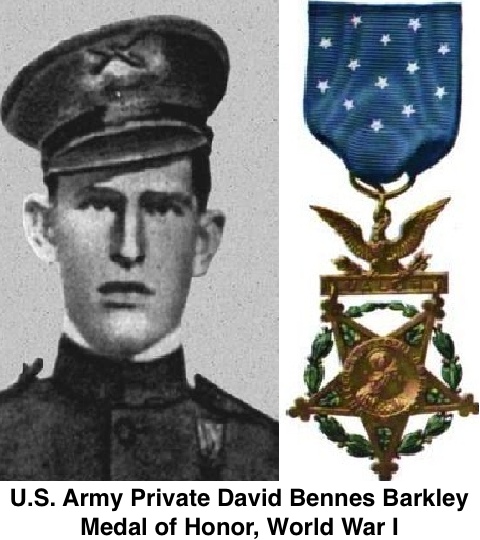 He was only 19 when he died in 1918, a kid who would become America’s first Latino Medal of Honor Recipient.
He was only 19 when he died in 1918, a kid who would become America’s first Latino Medal of Honor Recipient.
His posthumous Medal of Honor for heroism came in 1919, but his acknowledgement as a Latino had to wait until 1989.
David Bennes Barkley was born March 31, 1899 in Laredo in Webb County in south Texas, to Josef and the former Antonia Cantú.
He grew up with his Mexican-American mother. He enlisted in the Army when the United States entered what was then known as the Great War.
He used his Anglo father’s name to avoid being segregated into a non-combat unit.
As a part of Company A, 356th Infantry, 89th Division in France, he and Sergeant M. Waldo Hatler swam across the Meuse River near Pouilly-sur-Meuse to get behind German lines and gather information about troop strength and deployments.
They were able to gather the needed information; however, returning across the river, Barkley was “seized with cramps and drowned”. Sergeant Hatler survived to bring the information back to their unit.
Barkley was awarded the Medal of Honor for his actions, one of three Texans to be awarded the Medal of Honor during World War I. Additionally, France awarded him the Croix de Guerre, and Italy the Croce al Merito di Guerra.
Private Barkley’s body lied in state at the Alamo, the second person to ever receive this honor. He was then buried at the San Antonio National Cemetery.
Medal of Honor citation:
Rank and organization: Private, U.S. Army, Company A, 356th §→→→→§ 89th Division. Place and date: Near Pouilly, France, November 9, 1918. Entered service at: San Antonio, Tex. Birth: Laredo, Tex. G.O. No.: 20, W.D., 1919. Citation
When information was desired as to the enemy’s position on the opposite side of the Meuse River, Pvt. Barkeley, with another soldier, volunteered without hesitation and swam the river to reconnoiter the exact location. He succeeded in reaching the opposite bank, despite the evident determination of the enemy to prevent a crossing. Having obtained his information, he again entered the water for his return, but before his goal was reached, he was seized with cramps and drowned.
In memory:
Barkley has received three notable posthumous recognitions. In 1921, an elementary school in San Antonio, Texas, was named in his honor. On January 10, 1941, the U.S. Army installation, Camp Barkeley, was named in his honor. A clerical error resulted in the discrepancy in spelling.
Finally, in 1989 when his Hispanic background was discovered, Barkley was recognized as the U.S. Army’s first Hispanic Medal of Honor recipient.
